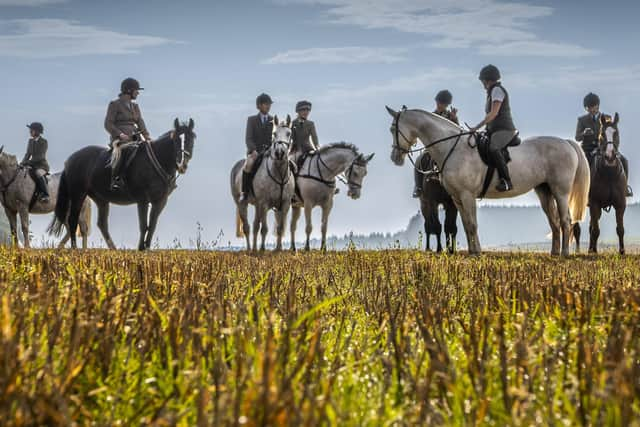Animal welfare concerns, licence confusion and hounds being put down 'inevitable' with new Hunting with Dogs Scotland Act
Hounds have been put down in the lead up to Scotland’s new fox hunting legislation being implemented this week with more expected to face the same plight, vets and hunt leaders have said.
The Scotsman understands multiple packs used for hunts north of the border have been euthanised, with the traditional practice at risk of folding under new restrictions.
Advertisement
Hide AdAdvertisement
Hide AdSeveral hunts have already disbanded, including the Fife Foxhounds, whose dogs are understood to have been moved to England, and the Lanarkshire & Renfrewshire Foxhounds.


The new Hunting with Dogs (Scotland) Act came into effect from Tuesday after MSPs passed a Bill back in January. It replaces the Protection of Wild Mammals Act, which was passed in 2002.
The law bans hunting and “flushing out” wild mammals with packs of dogs. Instead hunters are restricted to two dogs maximum to disturb the animal, which is then shot.
Environment minister Gillian Martin said the move “ensures that Scotland’s wildlife is protected and managed in a way that is both sustainable and humane”.
Police Scotland will be in charge of ensuring compliance with the new changes, which the Scottish Government said have closed a loophole that allowed illegal hunts to still continue until now.


Commenting on the new law, Angus Holman-Baird, of Kincardineshire Hunt, said: “It’s inevitable that you’re going to see hounds being put down. Some of them might go to other packs, but it’s likely others won’t be wanted.”
The Scottish Government said it recognises the working dogs will be affected by the act and pointed to charities that assist rehoming them.
But some hunt leaders said the hounds are a pack animal and separating them can cause serious welfare issues for the dog.
Advertisement
Hide AdAdvertisement
Hide AdClaire Bellamy, master huntsman at Lauder, who has 40 hounds and does predator control for 29 estates and farms, said: “There is no way I could part with my hounds. I just couldn’t.
"These hounds are pack animals and you can’t separate them. I have tried and it makes them so unhappy.”
Vet and chairman of the Veterinary Association for Wildlife Management (VAWM) David Renney said he would be “surprised” if fox hounds were continued to be kept given the cost of owning them.
Animal welfare concerns
While the Act has been hailed as “historic” for wildlife protection, concerns have also been raised for the welfare of the fox, members of VAWM have said.
Mr Renney said peer-reviewed research showed shooting as the only tool to control the predator brings with it a high wounding rate. “If we are to put welfare first, shooting should only be used when there is no alternative,” Mr Renney said.
"If a fox is wounded, you need the flexibility of using hounds to locate it, so it can be dispatched quickly rather than suffer more. Try finding a fox in thick vegetation when it’s wounded and doing all it can to conceal itself.”
He pointed to post-mortems of foxes hunted by hounds that were presented to the Burns Inquiry in 2001 by vet Ian Jones. These showed the dog goes straight for the neck.
"The death was confirmed to be ‘within seconds’,” he said. "Hounds need to kill foxes as quickly and cleanly as possible otherwise they get bitten.”
Advertisement
Hide AdAdvertisement
Hide AdMembers of VAWM said there was no science to back up that it is cruel to use a dog to hunt, with some members saying that using an animal similar to its natural predator – the wolf – would be the most natural method.
They cited an independent review commissioned by the Scottish Government in which Lord Bonomy said: “Arguably, the precise cause of death is irrelevant. What is more critical is how quickly insensibility and death result and how much suffering, physical or mental, the fox experiences … there seems little doubt, however, that in the vast majority of cases the time to insensibility and death is no more than a few seconds, bearing in mind the great disparity between the size and weight of the fox and the hounds.”
Mr Renney added: "You hear a lot of anti-hunting activists say the dog tears the limbs apart. But this is after the animal is dead. If you look at other predators like lions, they do the same thing.”
VAWM said the new restrictions would also put numbers of red-listed species, including ground-nesting birds such as the capercaillie, the lapwing and the curlew, at a higher risk. Mr Renney said it could even lead to the decline of the fox population.
Earlier this year, 103 vets from VAWM signed a letter to the UK Government warning the species’ population had plummeted in the wake of the 2004 Hunting Act.
The British Trust of Ornithology last year reported a 48 per cent decline in the red fox in the UK between 1995 and 2022. "With these restrictions, there’s no incentive to keep the fox,” Mr Renney said.
"I expect populations will decline, but in hilly areas where it’s more difficult to control them without dogs, they could become a real problem for other threatened species.”
Under the new Act, hunters can apply for a licence if they wish to use more than two dogs, which will only be permitted in certain circumstances such as preventing serious damage to livestock and the spread of disease, NatureScot confirmed.
‘It’s not just about red coats on horses’
Advertisement
Hide AdAdvertisement
Hide AdThe Countryside Alliance (CA), a campaigning organisation for field sports, said this, in itself, “is an explicit acceptance by the Scottish Government that the use of packs of dogs in wildlife management is necessary”.
But the application process “is unworkable, impractical and we believe some of it is unlawful”, said Jake Swindells, who oversees Scotland for CA.
He said ministers pushed ahead with the legislation “based on opinion, ignoring science and evidence”.
Mr Swindells said the proof threshold for the need for a pack of dogs was “so high” it would be “impossible” for practitioners to obtain a licence, so much so the CA had asked them to treat the application process “with caution” while it consulted its legal team.
"This is really not just about the red coats on horses,” he said. "This is a conservation issue.”
Comments
Want to join the conversation? Please or to comment on this article.
